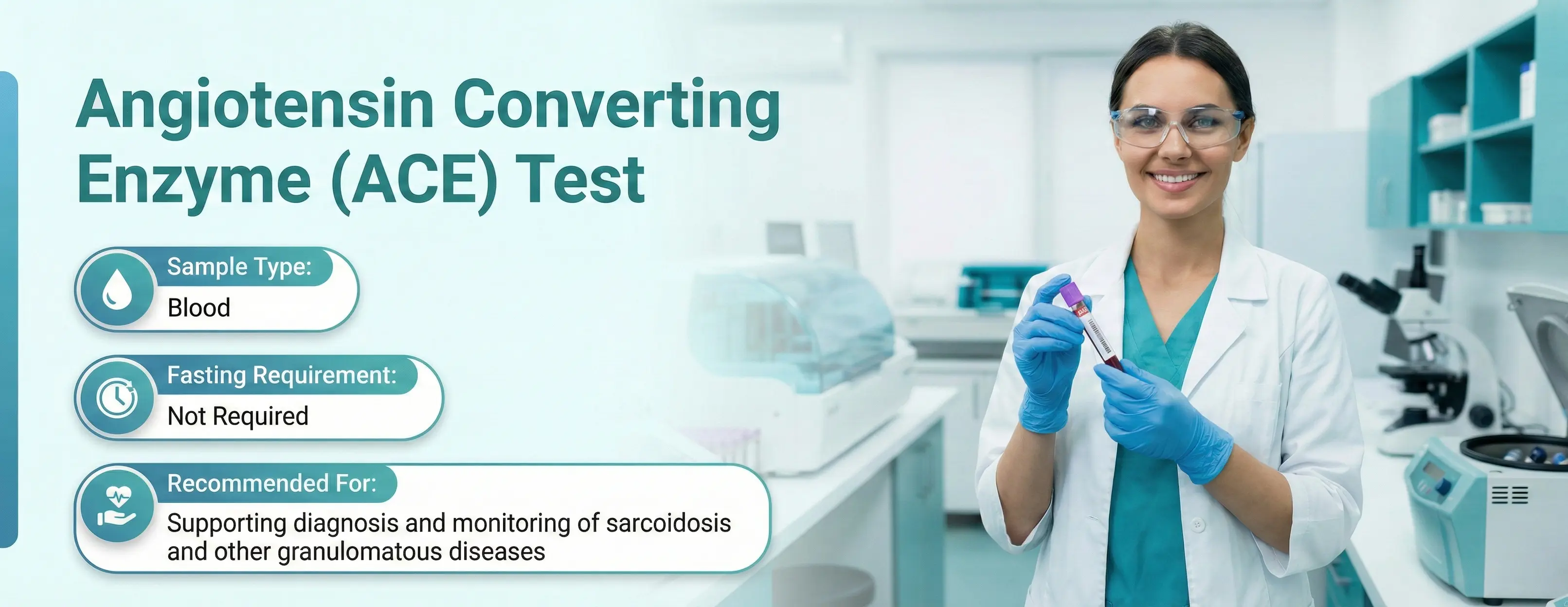49+ orders placed in your location
100% NABL & ISO Certified Lab • 100% Accurate Reports
Angiotensin Converting Enzyme (ACE) Test
ACE, SACE, Serum Angiotensin Converting Enzyme, Angiotensin Converting Enzyme Test
- SummaryThe Angiotensin Converting Enzyme (ACE) Test measures the level of ACE in the blood, which may help in diagnosing or monitoring sarcoidosis, and some other inflammatory disocrders.Elevated ACE levels can also be associated with disregulation of blood pressure. This test requires a blood sample, does not require fasting, and is suitable for individuals of any age or gender as advised by a doctor.Read more
- Reports Within33 HrsView Sample Report100% NABL & ISO Certified Labs
- SampleBlood
- AgeAll Age Group
- GenderMale and Female
- FastingNot Required
PharmEasy Promises
Know More About The Test
A quick info on Angiotensin Converting Enzyme (ACE) Test
Overview
The ACE Level Test is used to measure the amount of Angiotensin-Converting Enzyme (ACE) present in the body.
The right amount of ACE in the body is responsible for maintaining and regulating the body’s blood pressure in a normal state. ACE is an entity that converts one type of hormone to another type, i.e., from the Angiotensin, I hormone to an active vasoconstrictor called the Angiotensin II.
Angiotensin II causes the arteries to contract temporarily and as a result, it raises the pressure of the blood flowing inside those arteries. When the body has either too low or too high ACE levels in the blood, it usually suggests some ACE-related health disorder.
Some of the most common health issues related to inappropriate ACE levels include Sarcoidosis, Leprosy, Tuberculosis, Hyperthyroidism, Starvation and other lung disorders like Lung Cancer.
So, undergoing the ACE Level Test means that your healthcare practitioner has observed one or more symptoms of an ACE level health disorder and wants to check the ACE level for further treatment (if there is any required in the first place).
In India, the occurrence of Sarcoidosis and other ACE level-related issues like Hypertension has been a concerning factor for the Indian medical authorities. Their diagnosis still remains to be a problematic area.
Risk Assessment
Sarcoidosis, Gaucher’s Disease, Leprosy
What does this test detect?
Going for the ACE Level Test helps diagnose the following conditions:
- Sarcoidosis - Sarcoidosis is a lung disease that is linked to a high amount of ACE in the body. So, conducting an ACE Level Test is used for the diagnosis of this lung condition.
- Gaucher’s Disease - Gaucher’s Disease is a condition where fatty substances build up in the body and prevent other organs like the spleen and liver from carrying out their functions to keep the body healthy. This disease is also linked to the occurrence of high ACE levels. Therefore, conducting the ACE Level test can serve as a primary diagnostic test.
- Leprosy - Leprosy is a health disorder that can lead to skin lesions and severe nerve damage. This health condition is linked to the high levels of Angiotensin-Converting Enzyme in the bloodstream. So, the ACE Level Test can help in the diagnosis of this health condition.
Apart from the diagnosis, ACE Level Test can also be used in monitoring the results of various treatments like the sarcoidosis treatment, where the ACE level should be going down as the treatment progresses.
Indications for ACE Test
Doctors prescribe ACE Level Test for people who show the following symptoms:
- Coughing, wheezing or experiencing shortness of breath
- Fever
- Experiencing extreme tiredness
- Sharp chest pain
- Vision problems
- Unexplained weight loss and a loss of appetite
- Soreness or stiffness in joints
- Dryness in mouth
- Headache
- Unusual changes in the skin, sores, rashes and hardened spots
How frequently should you take this test?
The ACE Level Test is prescribed by your healthcare practitioner only on observing certain symptoms in you that may be pointing to an imbalance in ACE Level. This imbalance can trigger health issues which then show up in the form of certain specific symptoms.
If your symptoms remain persistent during the treatment, the doctor may ask to repeat the ACE Level Test.
Test Preparation
Before the Test
Prior to undergoing the ACE Level Test, it is essential to fast for A to B hours beforehand. This fasting period is crucial in order to obtain accurate test results. Therefore, it is advisable to consult a physician before taking any test to know if there are any specific restrictions to be followed.
During the Test
A phlebotomist will draw blood from a vein in your arm for the sample. Your experience will likely involve:
- Disinfecting the site where the needle will be inserted with an antiseptic.
- Wrapping a tourniquet around your arm to make the veins more visible.
- Inserting a disposable needle into the vein to collect the blood. This process may cause minor discomfort from the needle and could take a few seconds.
- Placing the sample in a small container or test tube labelled with your test information.
After the Test
Once the Blood Sample is Collected:
- Applying a bandage to the site where the needle was inserted to prevent any bleeding.
- You may feel slightly sore or lightheaded, which is normal and nothing to be concerned about. You may be advised to rest for a few minutes.
- Contact your doctor if you experience any bleeding, discomfort, or rashes at the puncture site.
Parameters
The ACE Level Test results can often be influenced by the way the particular laboratory conducts the tests on the collected blood sample. For example, some laboratories may report the results in the nmol/mL/min unit, whereas some other laboratories may choose the microliters unit.
The age of the person can also influence the ACE Level Test results. This is because, for kids, the ACE levels in the body are generally higher than the ACE levels found in adults. So, if you are getting your kid tested for their ACE level, their reference ranges for normal ACE Level test results will be different and need to be consulted with the doctor.
Ranges
The following table is a guide to understanding the various ACE-level test results:
|
Test Results |
Interpretation |
|---|---|
|
Lower than 40 nmol/mL/min |
Normal Level of Angiotensin-Converting Enzyme (ACE) |
|
Higher than 40 nmol/mL/min |
Higher Level of Angiotensin-Converting Enzyme (ACE) |
Different laboratories often have different ways of reporting the ACE level in the body. For adults, the range is mentioned above.
If you go for the ACE Level Test for kids, please note that the normal range of ACE levels in the body is generally higher than in adults. This happens because as we grow older, the level of Angiotensin-Converting Enzyme in the body starts declining.
So, make sure to check with your lab technician to know about the normal test ranges for children in their lab. You should also make a point to consult the child’s doctor right after you talk to the lab technician.
The normal values and reference ranges of the test may vary from lab to lab. Please refer to the ranges mentioned in the report and consult a doctor to understand the interpretation of lab reports.
Test Result Interpretation
Higher than normal ACE levels may suggest Sarcoidosis. A chronic disease that causes enlargement of lymph nodes in various parts of the body. If you are on treatment and have gotten back to normal levels of ACE, then it is still not a confirmation of not having any disease like Sarcoidosis. Do not stop or alter the doses of medication.
If you have symptoms but got a normal ACE Level Test result, your doctor will most probably ask you to go for further tests to get to the root of the underlying health problem.
If you have high levels of ACE Levels and also have symptoms, then your doctor might diagnose you with one of the problems related to ACE.
Some of the health issues related to high levels of ACE include:
- Sarcoidosis
- Tuberculosis
- Primary biliary cirrhosis
- Alcoholic liver disease
- Lung disease
- Hyperthyroidism
- Diabetes
- Leprosy
- Hyperparathyroidism
- Multiple myeloma
- Amyloidosis
- Gaucher’s Disease
However, you should keep in mind that getting a higher range of ACE levels on your ACE Level Test report does not automatically mean that you have a health disorder. Further tests are necessary to confirm the disorder.
Risks and Limitations
The ACE Level test is a standard blood test that is generally safe and does not commonly result in complications. However, kindly contact your physician immediately if you encounter:
- Persistent bleeding from the needle insertion site.
- Pain or swelling at the site of blood collection.
Limitations of the test
- Possibility of errors caused by equipment or human factors.
- Risk of misinterpretation of the test markers.
Was This Test Information Helpful?
Please rate your experience
References
People Also Ask
What diseases cause high ACE levels?
What does a positive ACE test mean?
What is considered a high ACE level?
Popular Tests
Have any doubts? Ask us.
Ask us anything about the Angiotensin Converting Enzyme (ACE) Test to understand it better
We provide trusted, expert-curated health content to support better awareness,prevention, and care.
Backed by experienced doctors, medical experts, and strict editorial standards.


